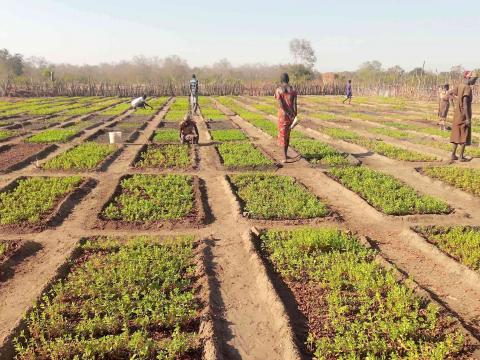Good harvests and savings give thousands of South Sudan’s farmers hope amid coronavirus pandemic

“I now own three goats, one bull and few chickens from the money I made out of the dry season vegetable farming. There is enough food for my family, what more can I ask for”, says Malou Mading with a huge smile.
World Vision’s South Sudan Integrated Food Security and Livelihood's Project funded by the Department of Foreign Affairs and Trade (DFAT) through the Australia NGOs Cooperation Program (ANCP) aimed to help South Sudan’s vulnerable population towards sustainable agriculture.
While the project has formally concluded its implementation on 30 June 2020, the households who benefitted from it will continue receiving support as part of another ongoing intervention Greater Resilience through Enhanced Agriculture and Nutrition, also funded by DFAT through the ANCP.
Through the project’s input support and training, it’s goal is to increase the income of an estimated 10,000 small-holder farmers and 60,000 community members in South Sudan’s Central Equatorial (Rajaf) and Warrap (Tonj North) States.
“We were able to join the project through our local chief and county agriculture staff”, says Akol Maluth, a 36-year-old lead farmer in Tonj North County. He adds, “Our being chosen to be part of this project was, for me, also the starting point of our new life.”

Akol shared that their community strength comes from being active church group members who believe, quoting his favorite Bible verse, “Work is a gift from God as one should always acknowledge his/her ability to be happy in it (Ecclesiastes 15:9).”
“We used to cultivate sorghum and groundnuts in our church farm but harvested little that was not even enough to be shared among the members due to the traditional farming practices we used", he recalls.
Our being chosen to be part of this project was, for me, also the starting point of our new life
Fellow farmer Malou Mading adds, “The training on improved farming practices, farming as a business, vegetable farming, farm tools and vegetable seeds received from the project, truly improved our lives as individuals as well as the whole community.”
Apart from improving their skills in farming, the project also trains the farmers who are part of the village saving and loan association. Akol’s group’s weekly contributions for the last six months now stands at SSP150,000 (USD$993).

“In May 2020, our harvest sold to the project 86 bags (50kgs) of groundnuts, sorghum, and sesame earning us SSP1,237,000 ($8,192) which will be used to buy more ox-plows, bulls, and extension of our 10 arches farm”, Akol says with pride at their accomplishment.
He further adds, “Unlike before, I can now support my two children in primary school with school materials like books, pens, and uniforms from the sales of my agricultural products. COVID-19 just stopped the children’s classes.”
The seed multiplication group led by Akol and Malou has become the light of the community with their unity encouraging everyone. The church-based principles contributed a lot to the success of the group as they urge neighbors to adopt the farming practices as a way to fight poverty.
Currently, there are five seed multiplication groups, 17 saving groups, and twenty vegetable groups actively participating in Tonj North County. World Vision’s project in the area covers Awul, Akop, Manlor, and Pagol Payams targeting a total number of 2,750 smallholder farmers for 2020 alone.
Related story: Village savings groups revive women's small businesses
Story and photos by Michael Deng Mach, ANCP Project Manager